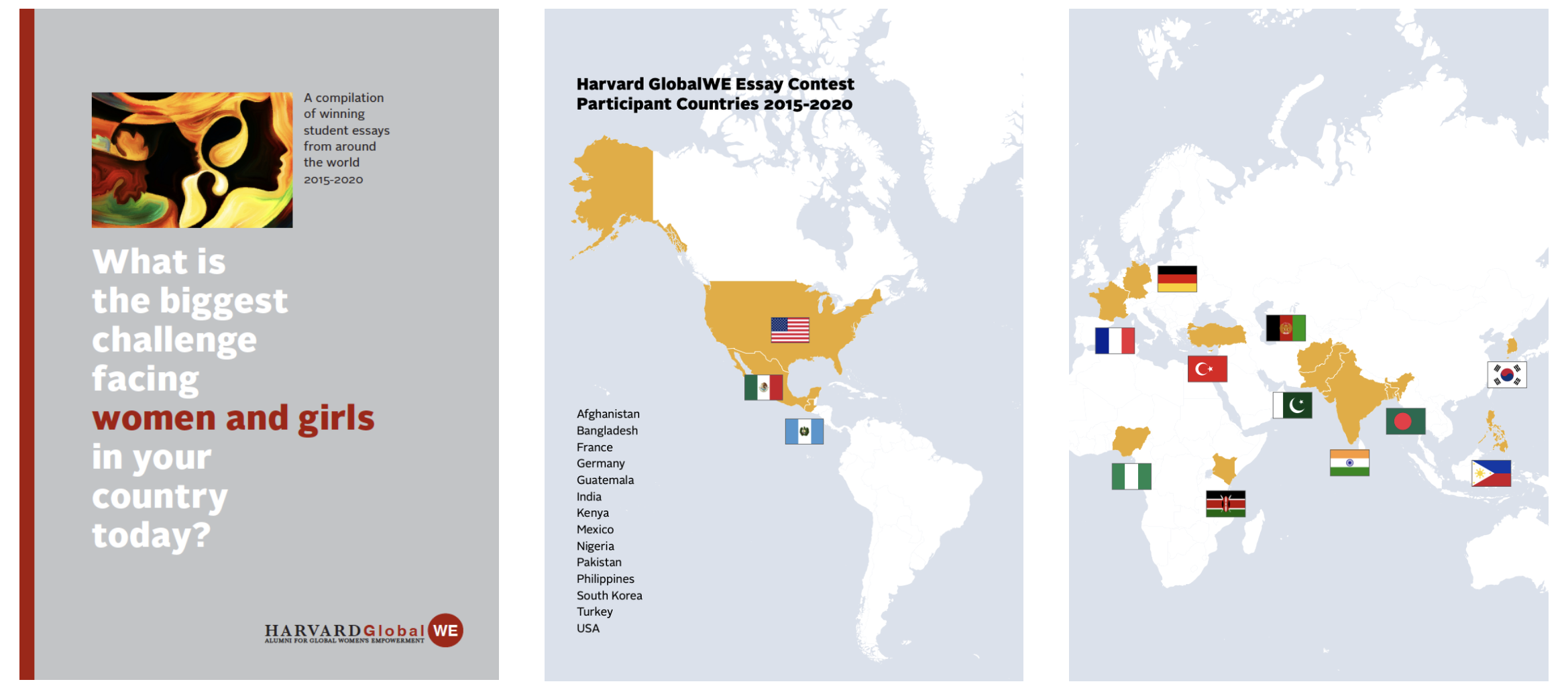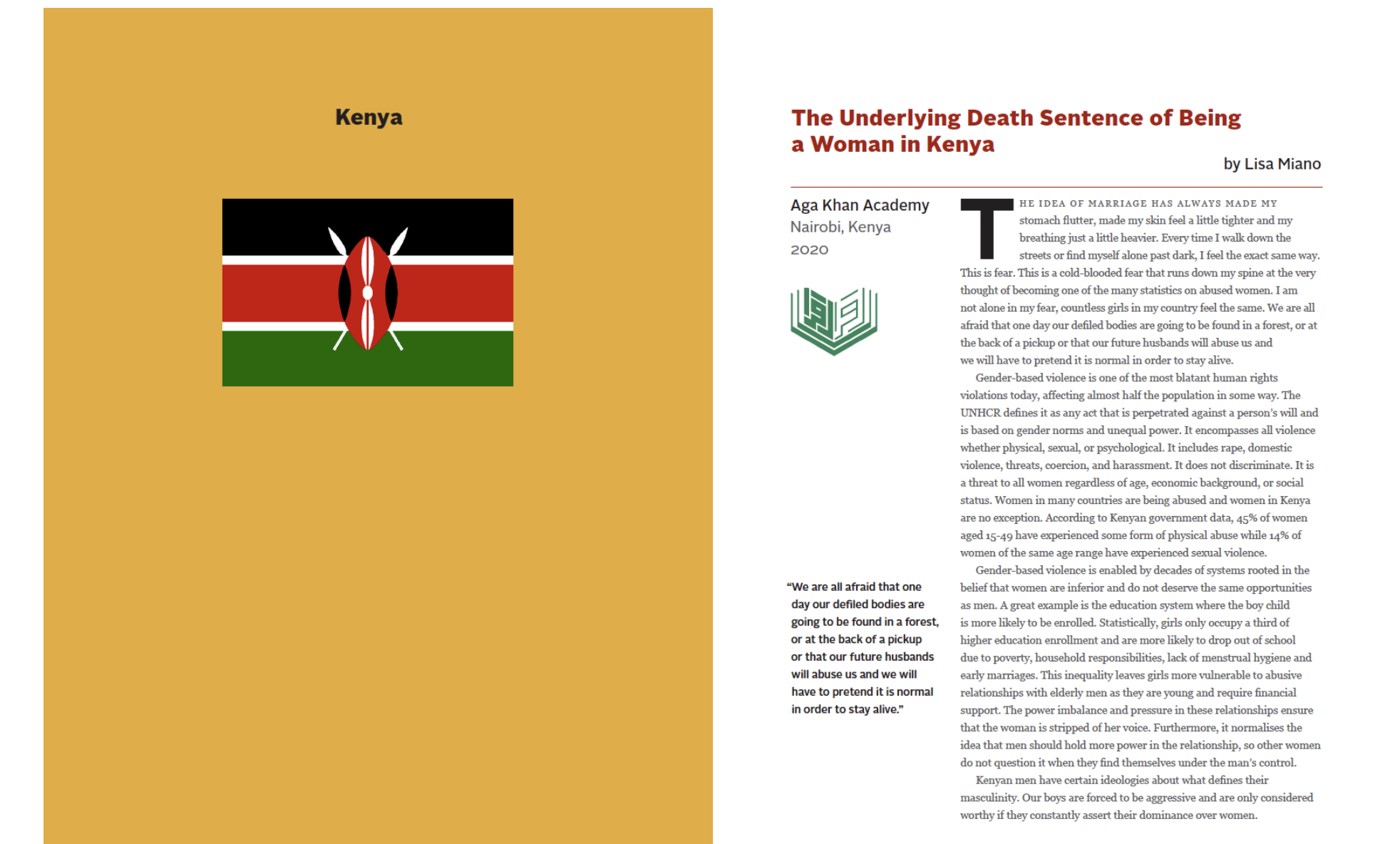Women of India by Uma Bakshi
Imagine this scene, if you will.
You’re in a dirty room, with your mother-in-law and the “doctor”. It’s a dark, and a dreary place, with the smell of blood and sweat in the air. The candle near you is the only light in the room. You are a woman, and you are giving birth to a child. You are in severe pain. Your husband is nowhere to be found. You are afraid.
Read More
Essay by Kate Monicah
There are numerous challenges facing women and girls in Kenya and talking about them can take eons but one of the major challenges facing women and girls is teen pregnancy and throughout my essay I will address the causes effects and measures taken to control teen pregnancy.
Read More
The underlying death sentence of being a woman in Kenya by Lisa Miano
The idea of marriage has always made my stomach flutter, made my skin feel a little tighter and my breathing just a little heavier. Every time I walk down the streets or find myself alone past dark, I feel the exact same way. This is fear. This is a cold-blooded fear that runs down my spine at the very thought of becoming one of the many statistics on abused women.
Read More
The First Step towards Women’s Empowerment by You Young Kim
In my school’s classrooms, it’s not surprising to overhear a table of girls chatting about the cosmetic surgery procedures they want to undergo. What is unusual, though, is to hear a Korean woman declare themselves a “feminist,” whether in a high school classroom or on the busy streets of Seoul. Expressing support for equal treatment and less rigid beauty standards for women in the deeply conservative country, where its education system remains the greatest obstacle to gender equality, is often met with criticism. A popular beauty YouTube star Lina Bae even received death threats when she deviated from her usual makeup tutorials and removed her makeup in a video encouraging women to free themselves from conforming to beauty standards. “An ugly and fat girl like you shouldn’t even be alive,” reads a comment on her video.
Read More
To Object For the Objectified by E Ju Ro
One spring day in 2016, in a public bathroom of the bustling Gangnam area, a young woman was stabbed to death by a man she had never met before.
“I did it because women have always ignored me.”
Read More
Confucianist Consequences and its Challenges by Christine Park
Korean Confucianism, Yu-gyo, is a long-standing tradition in Korea; filial piety, one of the three core values, is prized in a family over all other values. The samgangoryun states that there are five relationships that are necessary to ensure social order. Kings over servants, fathers over sons, and husbands over wives, to name a few. These relationships are parallel: wives should treat their husbands as they would kings, and sons and daughters should treat their fathers as their sovereigns. Younger people are meant to concede to the power of the people with more power, as dictated by the samgangoryun.
Read More
The Glass Ceiling of South Korea: Can Women Stay in the Workforce? by Jaesun Lee
The interviewer peers at the woman seated across from him and asks, “You’re a woman. Do you want this job? Don’t you want kids later on in life?”
The young interviewee nervously replies, “I do want this job, but I’m also planning on getting married and raising a family.” The interviewer looks unimpressed as he scrutinizes the resume in front of him. This is the same look this young woman received at the last interview where she was rejected.
Read More
Women Against Women: “Feminism” in South Korea by Minju Kim
My first “physical” encounter with feminism took place on one lovely Saturday afternoon while I was rushing to a nearby subway station after a soccer match. In South Korea considered one of the most conservative countries in East Asia, it is rare to see crowds of women gathering on a busy street, all holding large signposts and waving them, overwhelming the noise caused by nearby traffic with their shouts. My initial impression of the sight was appreciation. Living as a teenage girl, I was glad to see my peers gathering to cry out for the gender equality issue without compromising with the gender stereotype that has haunted our community for so long. However, as I approached the demonstrators to show my support, I had to step back as soon as I saw the slogans on their signposts filled with nothing but derogatory words and curses on the opposite sex.
Read More
Chained by the Shackles of Culture by Yunseo Park
“Honey, can you get me a coffee?” “Mom! Where is my shirt?” “Mom come on! I need you to take me to my academy!” “Mom, what are you cooking tonight?” “Sweetie, you’re almost thirty already – when are you going to have a baby?”
Read More
Essay by Vu Thi Thanh Ngan
In the paper, I analyses the convoluted mix among religious, traditional, and state ideology that confine women role in contemporary Vietnamese society. Since I am living in Bangladesh for my undergraduate, I will compare the intellectual context about gender issues in the two countries, and suggest a solution to solve the constraint for women in Vietnam.
Read More
Marriage without being educated by Sidhrah Mantaha Noha
In this essay, I will state that girls not being accessible to education has caused them to be subjugated after marriage.
Read More
Women are Human Beings by Ashley Kim
As women, are we simply entitled to equality? Or are we supposed to earn it? For me, the answer is obvious: gender equality is, first and foremost, a simple human right.
Unfortunately, in a world full of positive female role models, sexism continues to oppress women around the world, a phenomenon particularly evident in South Korea. Even today, it is the societal norm for women in Korea to serve men or act a certain way for their pleasure. We are expected to save a special seat at the center of the table for the “all-powerful” male; we are
Read More
Hidden in Plain Sight: The Plague of Misogyny by Minha Choi
South Korea is being lauded for its swift measures to contain COVID–19. Global news outlets praise our healthcare system and up-to-date technology that traces patients’ routes. But in April, a shocking bomb implodes within our small peninsula, an even more malignant disease that doesn’t even get half as much attention from foreign media—”Nth Room Case”. Modern slavery. 15,000+ users. When I read these words on the bus, my stomach drops. I look around as nonchalantly as possible and see three other passengers—all men—and the driver. They’re looking at their phones. One smiles a bit, scrolling through his screen. Involuntarily, my mind wonders how many “Nth Room” users could be on the bus with me that day, and I walk a little faster on my way home.
Read More
The Tarnished Purpose of Feminism in South Korea by Andrew Youngmin Cho
One movement, two realities.
The feminist movement in the US dates back to the 19th century with the Seneca Falls Convention in 1848, discussing the lowly social, political, and economic status of women. Simple and passive discussions soon evolved into active confrontations against the government. The bravery, as well as the resilience of women, was what ultimately elevated their status in Western society and normalized feminist movements in the coming centuries.
Read More
Making a Difference by Kyle Sohn
‘In the future, there will be no female leaders. There will just be leaders’ - Sheryl Sandberg.
Gender inequality has always been present in society, and nobody knows how far this future is - maybe
even so far it will never happen. The bond of trust between men and women to give one another equal
opportunity defines gender equality. Unfortunately, this bond has been broken, and women are doubted
all over the world. But there is still hope.
Read More
Breaking Past the Boundaries of Either/Or by Lynn Lee
My mother graduated from Yonsei University, one that is considered among the most prestigious universities in Korea. Afterwards, she enjoyed a successful career as a public relations director for an international make-up giant, and later as a lecturer at a university in Hong Kong, all the while raising three children. My mother is now a homemaker by choice.
Read More
Breaking the Silence by Yura Heo
Footage of a woman writing "slave" on her body, a video of a teenage girl barking like a dog in front of the camera naked. These are just a few out of thousands of sickening videos exploiting sex commercialized for trade through social media. Various methods were used to steal personal information from women in their teenage or twenties to use as a threat to send sexually provocative videos. After collecting the videos of "the slaves", they then secretly spread the footage to hundreds of thousands of people offering money to gain access to the videos. Young adolescents were sexually abused and ridiculed by more than 260,000 users hiding behind the screen.
Read More
From Shotgun to Driver; Escaping Passiveness by Seohyun Kim
About two months ago, my English teacher asked me why I wanted to leave my country at such a young age for studies. I told him about my future dreams of becoming a neurosurgeon in the USA. About how the society of my own country silently forces women to get married, give birth to children, and be content with their lives at home. I told my teacher how much I hated this implicit coercion towards women. After this conversation, I wondered, what kinds of experiences have I had to make me think women are the weaker sex?
Read More
Hidden: The Invisible Pain by Haedam Im
“Mom-Chung,” a cutting remark—Ji-young felt a stroke of severe pain in her heart. The short one-word disparaging mothers made her overwhelmed with emotion, recalling the bitter memories she had experienced as a mother. Mom Chung is a compound word of mom and “Chung,” meaning bug: a child-rearing bug. The word Mom-Chung denigrates ordinary mothers’ love and sacrifice towards their children. Ji-young speaks out of her sore heart, “I overcame all the pain to have a child and gave up my career, my dreams, my life, and all of myself to raise my child. And then I became a bug. What did I live for?” For many Korean women, this heart wrenching scene from the book Kim Ji-young, Born 1982 landed close to their heart. Though many people—including men—have always encountered such pain of women, it has always been considered a matter of course, rather than gender discrimination.
Read More
Because You’re A Girl by Seonjeong “Sophie” Kim
“Because you’re a girl.” Whenever I asked my parents why I couldn’t do what my brother was doing, this is the answer I got. The list of things that girls are apparently not allowed to do grew longer each year and include sleeping at a friend’s house, staying out after the sun goes down, and wearing shorts that are “too short.” When I challenged their response, they reminded me of all the famous incidences of sexual violence against women. They always end the discussion by warning me to behave more carefully as if my sexual violence risk is determined by the length of my shorts.
Read More


